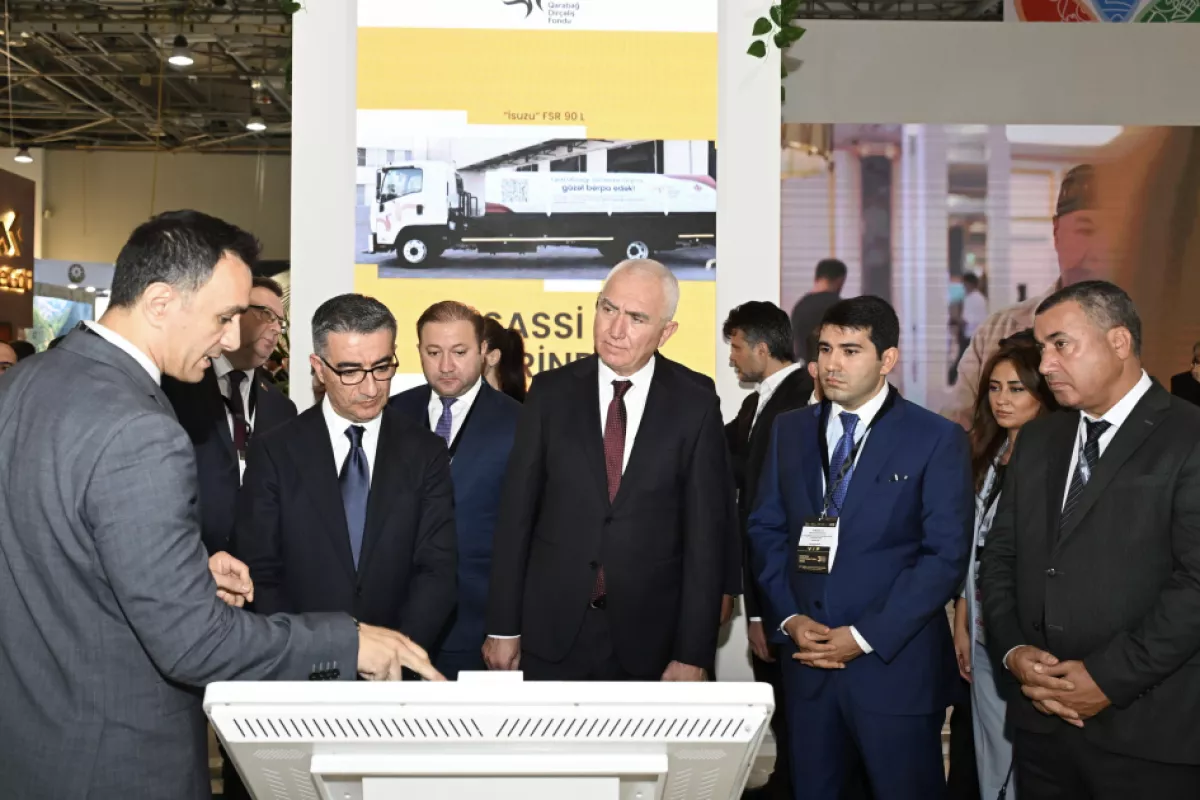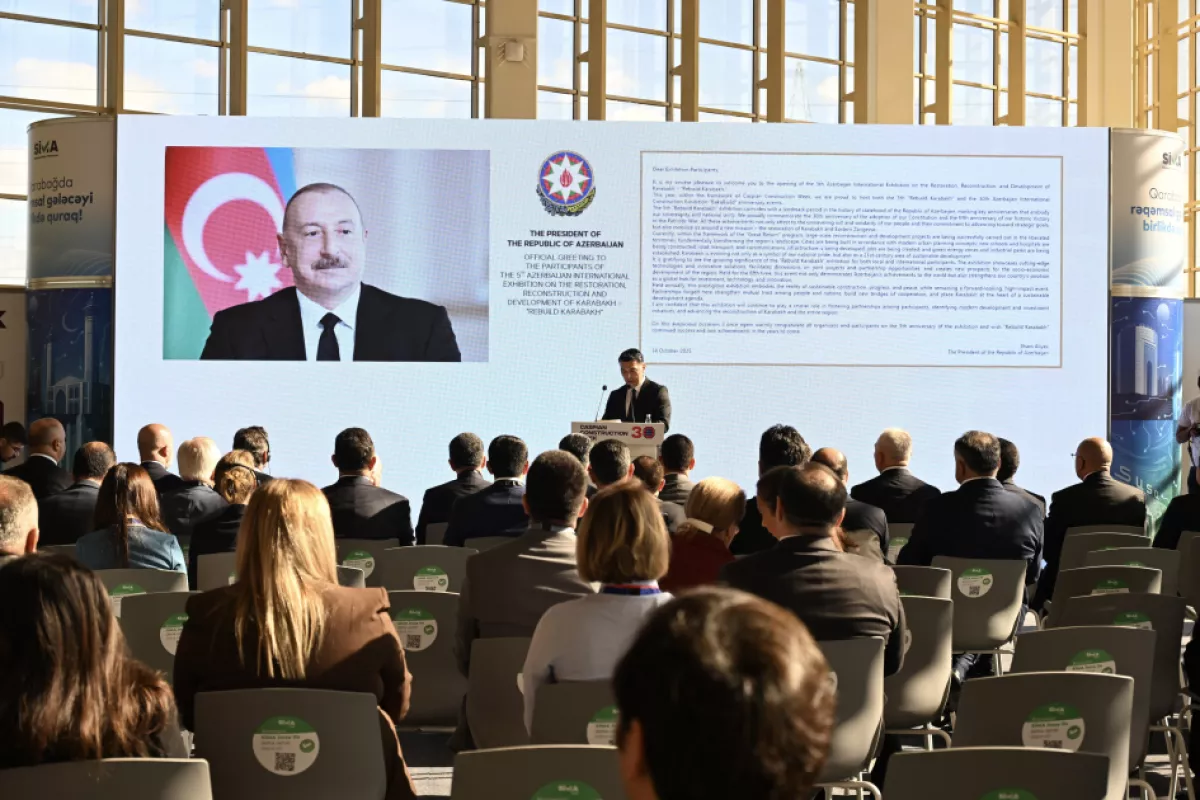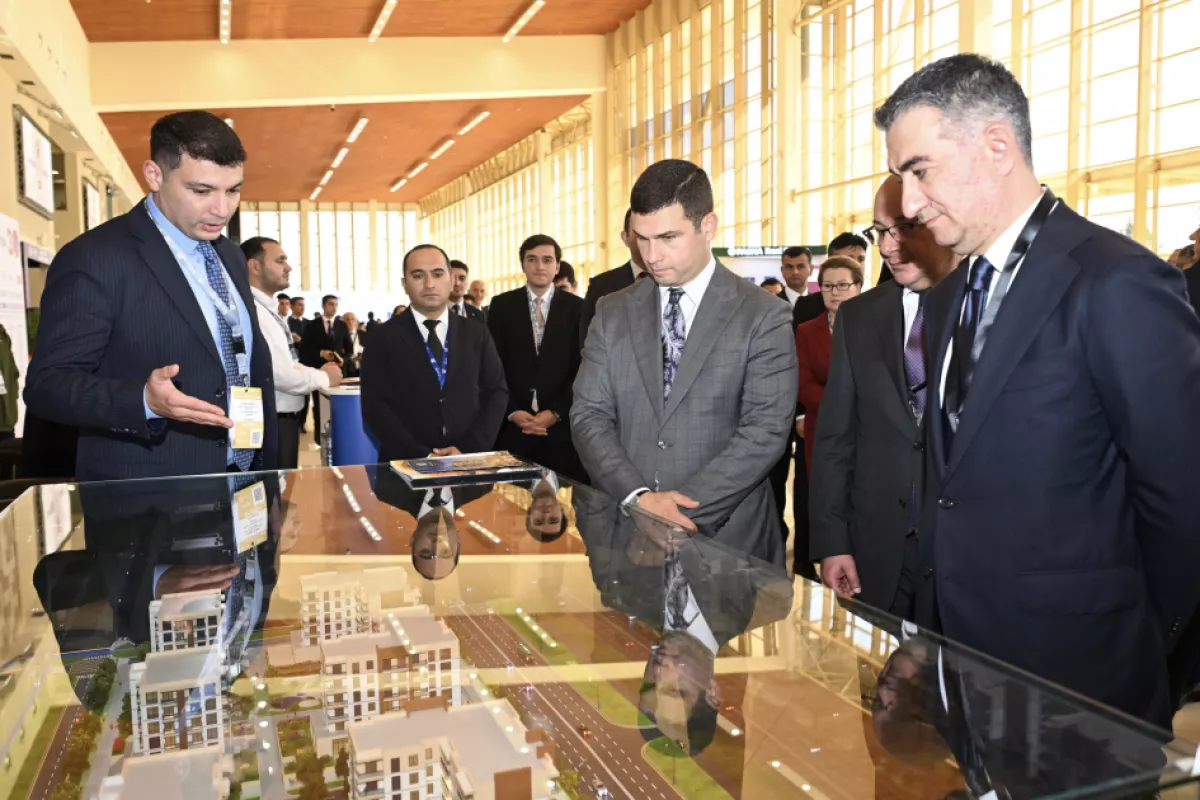Rebuild Karabakh: From the ashes of war to an era of creation Analysis
On October 16, the Azerbaijan International Exhibition “Restoration, Reconstruction, and Development of Karabakh – “Rebuild Karabakh” – concluded at the Baku Expo Center as part of the Caspian Construction Week. Since its victory in the 44-day war, Azerbaijan has launched a large-scale construction campaign across Karabakh and East Zangezur. Since then, this “grand construction” has become a key driver for the country’s entire construction sector — boosting the production of building materials and providing contracts for industry-related companies. The continued strong interest of market participants in this specialised forum demonstrates the high level of attention to the development of the liberated territories and, more broadly, to Azerbaijan’s construction industry.
First organised in 2003, the Caspian Construction Week has, over the past two decades, gained recognition as one of the most prestigious regional events in the field of construction and infrastructure. It has brought together more than 6,500 companies from 58 countries and over 200,000 professional visitors.
As a platform uniting major specialised exhibitions and industry experts, the forum provides an opportunity for companies from around the world to sign contracts, explore the business potential of Azerbaijan and the Caspian region, and discover new avenues for cooperation. The event hosts presentations of cutting-edge construction technologies, showcases innovative and environmentally friendly building materials, and features a range of seminars and other key industry activities.

The three-day exhibition dedicated to the reconstruction, restoration, and development of Karabakh, held as part of the Caspian Construction Week, is organised by Caspian Event Organisers LLC and Iteca Caspian, in partnership with their international collaborators ICA Events and Caspian Event Management FZ-LLC.
This forum is held alongside several long-established industry events — the 30th Anniversary Azerbaijan International Construction Exhibition – “BakuBuild”, the 17th International Exhibition for Heating, Ventilation, Air-Conditioning, Water Supply, Sanitary and Swimming Pool – “Aquatherm Baku”, the 4th Caspian International Plastics and Polymers Industry Exhibition – “Plastex Caspian”, and the 13th Caspian International Road Infrastructure and Public Transport Exhibition – “Road&Traffic.”
This year, the Caspian Construction Week exhibitors occupied three pavilions at the Baku Expo Center, with 299 companies from 17 countries taking part. Among the participating nations were Belarus, the UAE, Bulgaria, the United Kingdom, Israel, Iran, Kazakhstan, China, Russia, Romania, the Czech Republic, and the Republic of Korea, as well as Germany, Italy, Uzbekistan, and Türkiye, represented through national pavilions.
“This year, within the framework of Caspian Construction Week, we are proud to host both the 5th ‘Rebuild Karabakh’ and the 30th Azerbaijan International Construction Exhibition ‘BakuBuild’ anniversary events. The 5th ‘Rebuild Karabakh’ exhibition coincides with a landmark period in the history of statehood of the Republic of Azerbaijan, marking key anniversaries that embody our sovereignty and national unity. We proudly commemorate the 30th anniversary of the adoption of our Constitution and the fifth anniversary of our historic Victory in the Patriotic War,” said President Ilham Aliyev in his address to forum participants.
The head of state emphasised that Karabakh is being shaped not only as a symbol of national pride but also as a space for sustainable development in the 21st century: “Currently, within the framework of the “Great Return” program, large-scale reconstruction and development projects are being successfully carried out in the liberated territories, fundamentally transforming the region’s landscape. Cities are being built in accordance with modern urban planning concepts; new schools and hospitals are being constructed; road, transport, and communications infrastructure is being developed; jobs are being created; and green energy zones and industrial parks are being established.”

President Ilham Aliyev noted with satisfaction that the significance of Rebuild Karabakh for both local and international participants grows each year. The forum showcases modern technologies and advanced innovative solutions, facilitates discussions on joint projects and partnership opportunities, and creates new prospects aimed at the socio-economic development of the region. He emphasised that the event, held for the fifth time, not only demonstrates Azerbaijan’s achievements to the world but also further strengthens the country’s position as a global hub for investment, technology, and innovation.
The increasing interest in the Caspian Construction Week forums clearly reflects the eagerness of global building material manufacturers, construction service providers, developers of advanced technologies, and design and consulting firms to participate as contractors in the multi-billion-dollar projects in the Karabakh region. This is hardly surprising, given the unprecedented scale of the “Great Karabakh Construction” in the Caspian region: the budget allocated for restoration work in the liberated territories from 2021 to 2025 is estimated at over 23 billion manat ($13.5 billion).
At present, master plans have been approved for eight cities and 90 villages, covering a population of over 300,000 people. Citizens have already returned to six liberated cities and 22 villages.
During the initial phase of reviving the Karabakh region, the focus was primarily on infrastructure projects, including the restoration of transport, energy, water, communications, and municipal services. Over the past two years, the emphasis has shifted to the construction of residential and social infrastructure, as well as the establishment of service and production facilities through public-private partnerships to create jobs for citizens returning to their homes.
The most active preparations for the return of former internally displaced persons are underway in Shusha, Zangilan, Fuzuli, Aghdam, and Lachin districts, where large-scale housing construction is taking place. By the beginning of 2027, tens of thousands of apartments and individual houses are planned to be built in these areas.
A striking example of the effective modernisation of the liberated territories can be seen in the mountainous Lachin district.
“The first phase of restoring Lachin district was successfully completed over the past three years, transforming it into a centre for international cooperation and cultural dialogue. Six settlements have been commissioned, and more than 30 enterprises have been established — and this is just a small part of the large-scale projects underway,” said Masim Mammadov, Special Representative of the Azerbaijani president in Lachin, during the Rebuild Karabakh exhibition.
“In Lachin, a new airport and hotel complex have been commissioned, a modern cable car is under construction, and steps are being taken to develop tourism infrastructure. Plans are also in place to implement a project to supply drinking water to major cities.”

Meanwhile, Tofig Islamov, Acting Executive Director of the Service for Restoration, Construction, and Management in Lachin district, noted that 226 homes have been restored in the region, and as part of the Great Return programme, over 3,000 people have resettled there.
He highlighted that the district is actively adopting renewable energy technologies (RES): solar panels have been installed on the roofs of 24 homes, solar collectors connected in 90 homes, and street lighting is provided through hybrid solar lamps.
“In the villages of Zabukh and Sus, as well as on the roofs of two schools and administrative buildings, solar panels have been installed. Lachin district also operates 11 small hydropower plants, generating more than 80 million kilowatt-hours of ‘green’ energy, saving over 20 million cubic metres of natural gas,” emphasised Islamov.
Notably, green energy and energy efficiency principles have been designated as key priorities for the development of the entire Karabakh region.
Speaking at the forum, Javid Abdullaeyv, Director of the State Agency for Renewable Energy Sources, emphasised that energy efficiency standards have been strengthened in Azerbaijan’s liberated territories. As part of establishing a green energy zone, four regulatory and technical documents were approved with the involvement of Japanese consultants. The State Committee for Urban Planning and Architecture has adopted energy efficiency categories A, B, C, D, and E, following the European model. In Azerbaijan, the operation of buildings below category C is already prohibited, and no low-category buildings will be allowed in the Karabakh region.
In this regard, Abdullayev highlighted the village of Aghali in Zangilan district as a benchmark for sustainable solutions and green technologies: “Today, Aghali has set a sort of benchmark against which we can measure all our work. The smart solutions implemented there, including the Archimedes installation and other mechanisms supporting active consumers, have been systematically introduced in urban planning practice for the first time in the country, specifically in this village.”
Participants of the construction forum also shared information on large-scale residential construction in other settlements of Karabakh, including Hadrut, Khojaly, and Sugovushan. They highlighted plans for the creation of a major central park in Fuzuli, the restoration of the ancient caravanserai and museum building in Shusha, and the development of tourism infrastructure around the Shahbulag Fortress in Aghdam district, among other projects.








